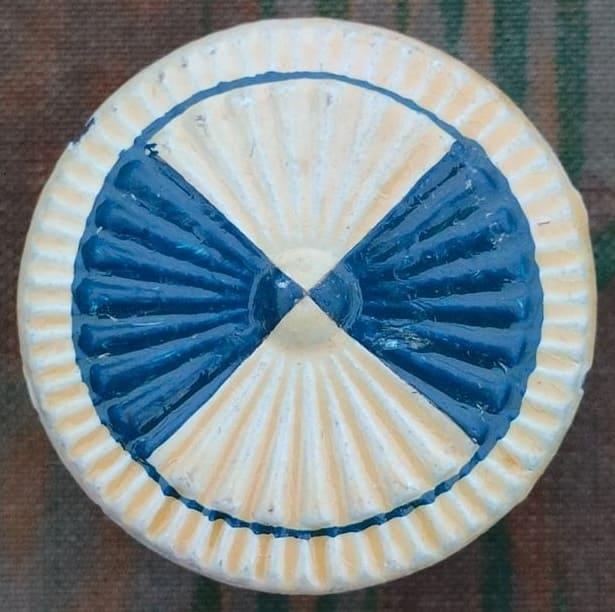 Flagge "Flagge des Kanton Zug" bei fahnenversand.de kaufen.
Flagge "Flagge des Kanton Zug" bei fahnenversand.de kaufen.
 Flagge "Flagge des Kanton Zug" bei fahnenversand.de kaufen.
Flagge "Flagge des Kanton Zug" bei fahnenversand.de kaufen.
Last modified: 2025-03-22 by martin karner
Keywords: switzerland | zug | canton | german |
Links: FOTW homepage |
search |
disclaimer and copyright |
write us |
mirrors
Description of the Flag
Argent, a fess azure.
On a white field, a horizontal blue band.
T.F. Mills, 17 October 1997
Symbolism of the Flag
The arms of Zug were probably granted by Rudolf of Habsburg, whose
own arms were "gules, a fess argent" (i.e. same design, different
colours). The original owners of Zug were the counts of Lenzburg
whose arms were a blue disk on a white field. Thus the Zug flag and
arms appear to be derived from Habsburg and Lenzburg (Some sources
attribute the colour influence to neighboring Luzern and Zurich). A
fess is sometimes interpreted to be a military belt or a girdle of
honour.
T.F. Mills, 17 October 1997
History of the Flag
Zug was a town of the Austrian dukes and waged war against the Swiss
Confederation, most notably at the battle of Morgarten in 1315. The
Austrians used Zug as a wedge and staging point in campaigns against
the Swiss, but when in 1351 Zurich joined the Confederation, Zug was
totally surrounded and its position untenable. The Swiss besieged
Zug, and when it became clear that Duke Albrecht had abandoned them,
they opened their gates and went over to the Confederate side. By the
Peace of Thorberg in 1368 Zug was officially admitted to the
Confederation, but in 1414 this arrangement was backdated to 1352.
The earliest evidence of the Zug flag is dated at 1319.
T.F. Mills, 17 October 1997
– First seal of Zug (1319), circumscription: S. VNIVERSITATIS DE
ZVGE (seal of the community of Zug) (source).
– Banner of Zug, early 16th century. 77x115.5 cm. Location: Museum Burg Zug (source).
– Stained glass plate (ca. 1530), banner bearer with Julius Banner (Zwickelbild: Lamentation of Christ), coat of arms. In the left upper corner St. Oswald, a patron saint
of Zug, in the right corner St. George, fighting with a dragon (patch from an other pane). Location: Museum Burg Zug (source).
– City banner of Zug, carried in the Second War of Kappel (1531), with unusual vertical stripes (source: [b7b42]).
– Stained glass plate (1557) by Carl von Egeri. On the right the banner carrier (Bannerherr)
Wolfgang Kolin with the Julius Banner. On the left a Captain with Confederate Crosses on his chest strap.
Location: monastery of Muri (source).
– Coin "Engeltaler" (1565), with coat of arms (source).
– Banner of Zug, captured by Protestant troops in the
Toggenburg War (1712, a.k.a. Second War of Villmergen) (b/w photo, source: [b7b42]).
![[Colour Flag ZG]](../images/c/ch-zg_56.gif) image
by Ole Andersen
image
by Ole Andersen
Rectangular cantonal flag, as shown in Kannik (1956) [So-called
colour flag (Farbenfahne in German). As a special case the colour flag of ZG keeps the design of the
regular flag].
Ole Andersen, 4 August 2002
See also: STATE COLOURS in Dictionary of Vexillology
Flaggen, Knatterfahnen and Livery Colours |
![[Knatterfahnen]](../images/c/ch-zg_kf.gif)
|
Flaggen are vertically hoisted from a crossbar in the manner of gonfanon, in ratio of about 2:9, with a swallowtail that indents about 2 units. The chief, or hoist (square part) usually incorporates the design from the coat of arms – not from the flag. The fly part is always divided lengthwise, usually in a bicolour, triband or tricolour pattern (except Schwyz which is monocolour, and Glarus which has four stripes of unequal width). The colours chosen for the fly end are usually the main colours of the coat of arms, but the choice is not always straight forward.
Knatterfahnen are similar to Flaggen, but hoisted from the long side and have no swallow tail. They normally show the national, cantonal or communal flag in their chiefs.
Željko Heimer, 16 July 2000
See also: HANGING FLAG, VERTICALLY HOISTED FLAG, LIVERY COLOURS in Dictionary of Vexillology

 images located by Martin Karner
images located by Martin KarnerAt the beginning of the 20th century, flamed flags were still in use, with the white cross replaced by
a (baroque) shield in the centre of the flag. These decorative flags had been used until WWII and then
somewhat forgotten in preference of the current cantonal flags. [Today they are being
produced again, see right image]
Pascal Gross, 30 June 2002
See also: • National flag and other cantonal flags with "Early 20th century flag design"
• Modern flamed flags
• FLAMMES in Dictionary of Vexillology
logo.jpg) image located by Martin Karner (8 May 2024)
image located by Martin Karner (8 May 2024) image located by Martin Karner
image located by Martin KarnerCockade for the cantonal troops' headgear (regulation from 1898, size: ca. 35 mm, reverse side).
Martin Karner, 14 March 2025
See also: Cockades (Swiss Army)







